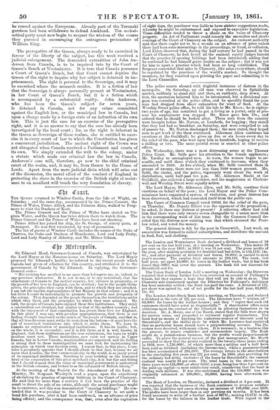The prerogative of the Queen, always ready to be exercised
in favour of the liberty of the subject, has this week received a judicial enlargement. The demanded extradition of John An- derson from Canada, is to be inquired into by the Court of Queen's Bench at Westminster. It is true that Canada possesses a Court of Queen's Bench, but that Court cannot deprive the Queen of the right to inquire why her subject is detained in im- prisonment. The right is personal to the Sovereign, and it may be exercised where the monarch resides. It is a fiction of law that the Sovereign is always personally present at Westminster, in her Court of Queen's Bench, but it is a fiction which is accompanied by a substantial reality. John Anderson, who has been the Queen's subject for seven years, is detained in Canada, not for any crime committed against the English law, or the municipal law in Canada, but upon a charge made by a foreign state of an infraction of its own law. This is just the ease for an exercise of the prerogative right, and it is no answer to say that the case has already been investigated by the local court ; for, as the right is inherent in the Queen as Sovereign of these realms, she is entitled to exer- cise it in every court of law to which the Constitution has given a e,oneurrent jurisdiction. The ancient right of the Crown was not abrogated when Canada received a Parliament and courts of its own. We simply extended the writ to the colony, under a statute which made our criminal law the law in Canada. Anderson's case will, therefore, go now to the chief criminal court of the realm, and, it may be, from thence to the House of Lords. Apart from the mere judicial dicta which will arise out of the discussion, the moral effect of the conduct of England in protecting the slave in the exercise of the British right of resist- ance to an assailant will touch the very foundation of slavery.


























 Previous page
Previous page